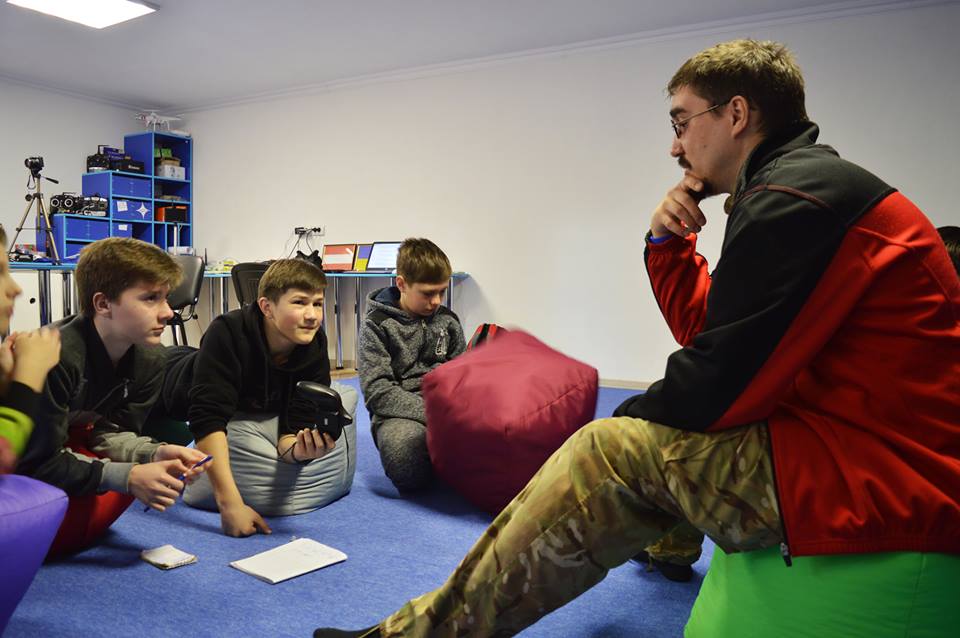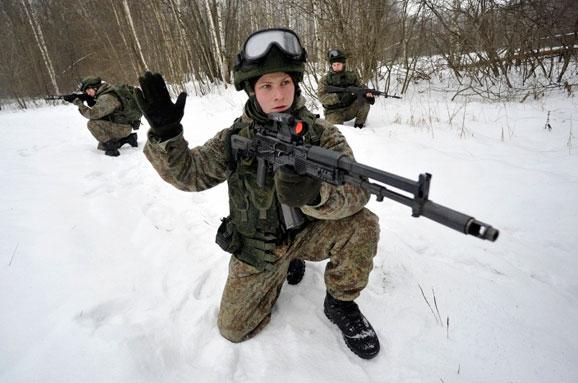But the war not only destroyed - it created as well. This story is about the friendship between a Ukrainian soldier and a teenage boy whose town, Popasna, was released by the soldier's battalion. Now both of them leave in a town in northwestern Ukraine. Here they created a drone club for teens. The war veteran doesn’t mention politics or war when working with the children. Instead, he prepares them for adulthood by exploring values which conventional school education doesn't cover.
To meet Vania, the soldier, I traveled to Korosten, a city in Zhytomyr Oblast, 2.5 hours from Kyiv. The mayor of the city is an ex-communist. Life here is similar to life in ordinary towns of Donbas, on the other side of the country. The only difference is that the war pushed many towns in Luhansk and Donetsk oblasts to change, for better or for worse. In Korosten, it seems that time has stopped and nothing will change its post-Soviet reality.
After meeting me, Vania went to pay the Internet bills for his Copter Club, spending almost all the money he has. He does not have a permanent job in Korosten and invests all his efforts in developing the club. Before starting to work with children, Vania tried to activate local adults to build a community which would make Korosten a better place. However, he gave up on this idea when realizing that the majority of Korosten residents are OK with its current state – they complain about the current government, but do not want to do anything themselves.
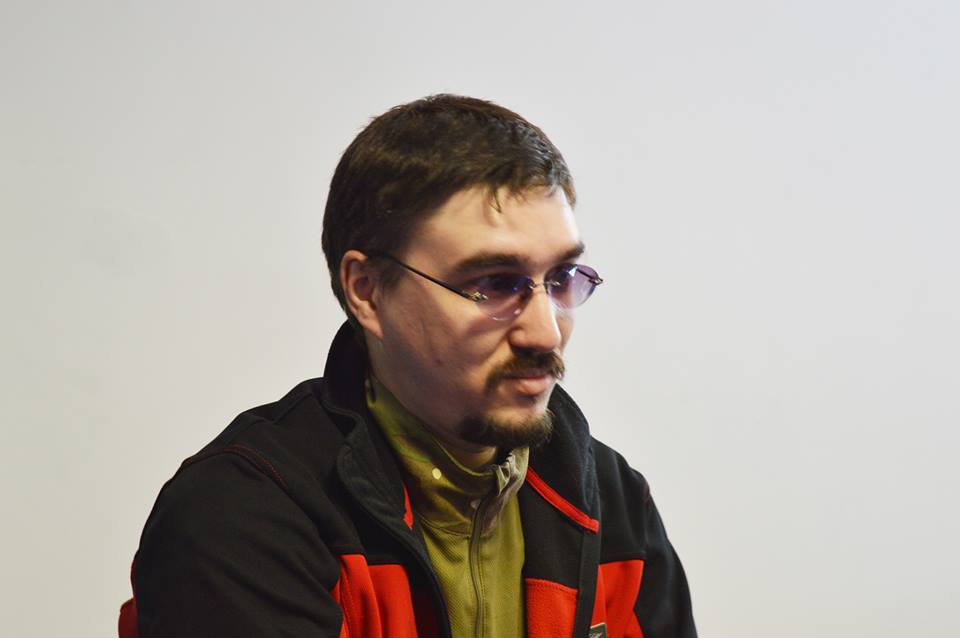
Born in Donetsk, Vania dreamed about changing the system and finally, he received this chance:
“When we drank beer in kitchens with friends, we discussed how good it would be if the system collapsed and we would build everything from scratch and fix everything. None of them took advantage of the situation. They simply moved. But I felt that this is my path.”
Vania says that he did not support the Euromaidan Revolution at the beginning and still doesn't feel an emotional connection with the event. But when the situation became hot in his native Donetsk, he couldn't stand aside:
“I was outraged by the actions of our so-called police that time. With its connivance, peaceful protests were raped by a crowd of bastards with brass knuckles, pipes, guns etc. What happened next made me realize that a radical historical change is underway. Waiting it out wouldn't have worked, and neither did I want to. That is why I decided to take the hatchet of war and defend my country, my land and first of all my beliefs that it is fair.”
That is how Vania joined the volunteer battalion Donbas as a rifleman. He used to serve in the army before, mostly as a musician in a military orchestra. In the Donbas battalion he was accompanied by people from very different walks of life:
“We defended our inner world. All the holy things we had. The first bunch of volunteer soldiers consisted of very different people - from criminals to policemen, from teachers and musicians to ex-soldiers. From different strata of society – poor or very wealthy. However, everyone had an understanding that common sense should be maintained. It should be defended from the all the madness which was coming to us from the east. It united us and helped us to defend the places we were standing for and later to release many seized [by the Russian collaborators] territories.”
Now the former soldier does not see the point of being at war:
“There are people who like to fight. I respect them, but I am not like them. I understood the meaning of it when we had an opportunity to free something. Or if there was an attack, there would be a point to unite and to defend. For about 3 years now, the war drags sluggishly on. I needed to understand what comes next. There should be some life.”
Vania left the front line in winter 2015. He says that the most complicated thing for him was to find money for a living:
“Everything else is hard psychologically, but it can be solved, it is a process. The biggest problem is that I can't live as I used to live and I do not want to. I do not want to be involved in some schemes as I used to be. I do not want to earn money in illegal ways. However, it seems that I can get needed amounts only in illegal ways. Here there a lot of ways for the war veteran to earn – [illegal] amber, granite quarries etc. Some people suggested I participate. But this would be my moral suicide. This is what I was fighting against at war.”
And it happened that Korosten became a new home for Vania. As well as for his younger friend Erik, a boy whom he met at war.
An unusual friendship
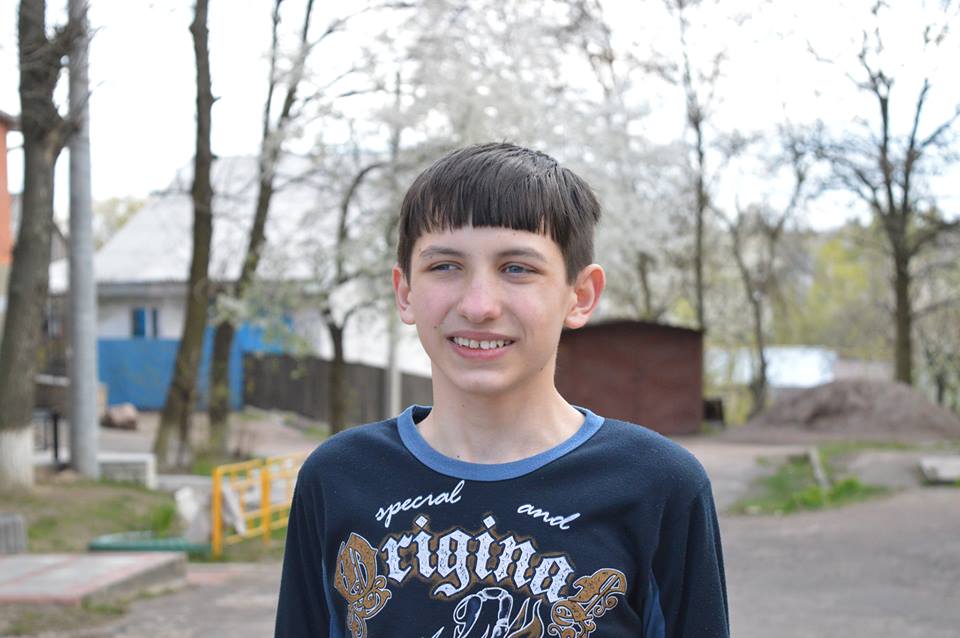
Erik was 11 years old when the war knocked on his door in Popasna, a town in Luhansk Oblast. Still, he remembers all the details:
“I used to live calmly and did not touch anyone and then the war broke down and shelling started. On the 18th [of July 2014], at 8.30 in the morning, the first shell fall down...When they [Donbas battalion] came to us the first time, everyone was glad: 'Hooray, we are released!'. But then shelling started again and we started to hide again. And later in the evening we were sitting near the school and waiting for the next shelling [the town was released on July 22, 2014]. This time it was aimed not at us, but away from us. They [Ukrainian soldiers] took control over the place and had to go faster to release the next places. And then we saw the first bus coming to us. And then the second, the third and the fourth. This was the Donbas battalion which released us.”
Were not you afraid of the soldiers?
At first, yes. About 800 people with guns came in. They brought artillery. 4 buses and also some armored vehicles and quads. It was interesting. A few brave guys came out to them.
Did your parents allow you talk to soldiers? Were not they afraid for you?
They knew and didn't oppose. They were hard times. The soldiers helped us, distributed humanitarian aid. When the boys became a bit braver, they asked the soldiers to teach them to assemble guns.
Erik says that he gets along well with people. During war time, it was the same:
“Soldiers are also people. But with guns. They have good honor and intentions. It makes them good people. I have not met the soldiers from the opposite side. Before them, we did not know what war is.”
Then, Erik and Vania started to be friends. Also, Erik had another older friend, a soldier some 20 years of age who later died in battle.
After being liberated, Popasna continued to be shelled with artillery. Vania told Erik's mom to move to a safer place. In winter 2014-2015 when the attacks became too hard, she called Vania to help them with the evacuation.
That is how Erik and his mom eventually got to Korosten. The boy says that the peers here welcomed him friendly. Although he misses his home a lot:
“I walk around here in autopilot mode, remembering my roads back at home where I know everything...”
The boys still experience the fears left after the war:
“If you are a person from Donbas, you are not human anymore, as your instincts have been woken up. If you hear a loud noise, you turn around. I feel it less now, not like it was before - when you turn even if you hear a spoon hitting a table. Now there can be loud noises when quarries are blown up. And you recall your homeland is at war. Or if a tractor starts and your legs run away by themselves. I can't bear closed places where a lot of people gather. We have a dressing room in school. I either go the first or the last, I do not like it. Everybody is shouting there.”
Erik says that the greatest fear is fear for others. During warfare in his town, he was afraid the most that his grandmother and mother would not be able to run.
Despite the situation in Popasna being calmer now, Erik does not come there often. They left their home in ruins - it still has no heating and hot water.
Once Vania wanted to please his younger friend:
“I wanted to show him real toys till he is still a child.”
Friends intended to buy a toy tank. However, there were no tanks and they chose a drone. That's how the Copter Club started.
The Copter Club
Neither Vania nor Erik had flown drones before but fell in love with this activity from the first glance. Vania asked Erik to call his friends. That is how the club appeared.
The guys were learning together how to assembly, fly, and repair drones.
“The Ukrainian pilot community, some hundred people, constantly helped us with drone parts and money,” explains Vania.
In the end of 2016, he even organized inner drone racing competitions for the members of the club. Now they are preparing for serious external ones.
At the lesson I attended, Vania explained the students some theory and then immediately showed it in practice. He still learns the details of the field together with his students. But what the main thing he wants to give them is not the theory and practice of drone flying, but being a responsible person. As Vania believes, only a new generation without the Soviet past can change the system. So that he wants to teach them to think and not to follow the patterns of the current old system:
“In childhood we all were taught to talk about the bright future and to think that it will come true some day. And all the time the date was moved to the future. You are already 16. You realize that the future will come some day, but you are told that you are already an adult and have to go to work. Just yesterday you were forbidden to go out of home without permission and today you are required to make conscious and responsible decisions. But you were not taught how to do this. So your world collapses, everything breaks down. You look for a place to run away - drugs, alcohol, or games addiction. And you end up in some company which adjusts you according to it and you take its manners and customs. What I want to bring to them is related to the perception of the world. I am not a teacher for them. I want them to learn how to learn. The concrete wall should be broken. It was built from childhood year by year – do not think, do not try, do not do... And if you do, you close your eyes and do it haphazardly.”
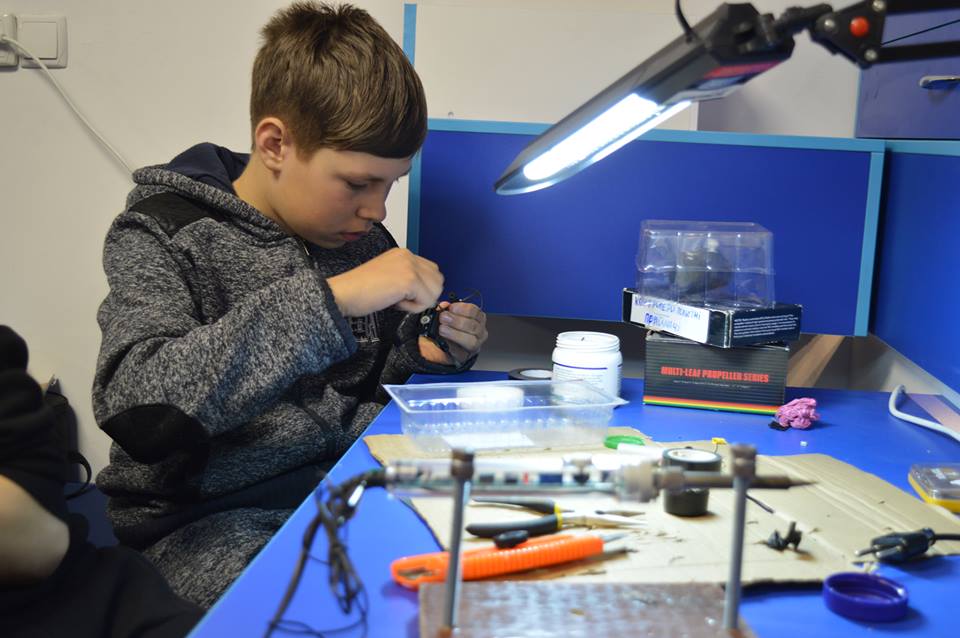
The main task of the Copter Club is self-development, for the students and for Vania:
“I just try to give them the basics. And also show it on my example. We have laws, there are traffic laws, there exist rules not to make a mess and to clean after yourself. If you see some trouble, analyze it and fix it. Because no one will care about it except you. So we take control of the world with our own hands. And when they become a bit older they will take this attitude to society.”
Vania does not raise topics of politics and war with children. However, they know his background:
“For half a year, we had lessons at my apartments. I had a bag with military things there. I do not have civil ones. Also, there is Erik, and he tells them where I came from and why I am here.”
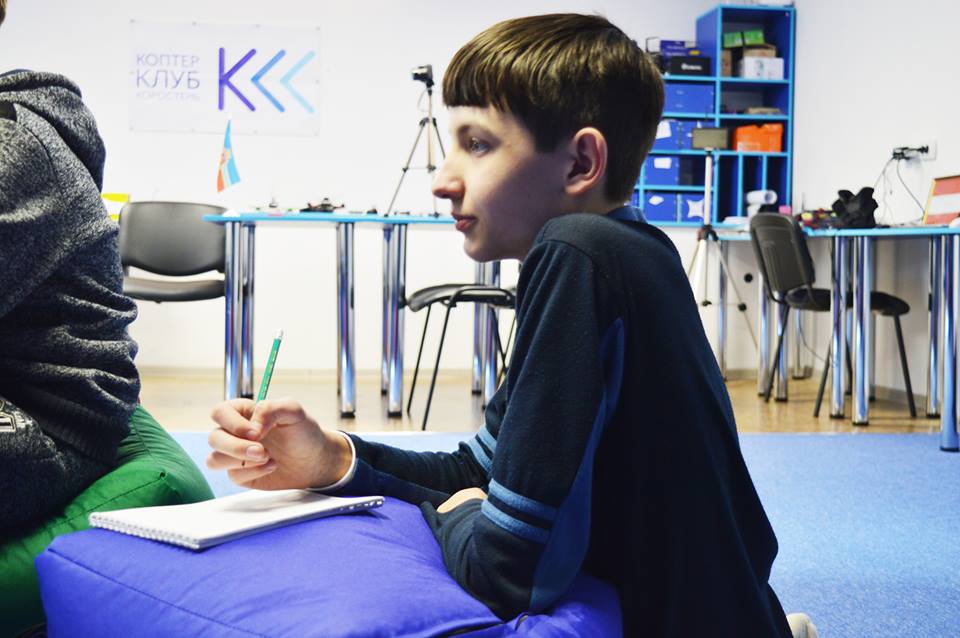
I asked Erik whether the other boys are afraid of Vania:
“At first some were afraid. The first training when there was no club or anything else, we were just taught to fly. But for me...It is my Vania. I was not afraid of him and never will. I know that he will never do something bad to me. For the others, Vania is now their trainer. They do not care about his past,” answered Erik.
The boy goes on telling that sometimes Vania can recall some funny story from the war:
“There are only scary funny things coming from war. You can tell them in a funny way. But in fact, they are scary. For example like when they escaped from the entrapment.”
Does he tell them to everyone?
No, only to me. He would not tell this to anyone else - they wouldn’t understand. They don’t need it. I do - I heard the explosions of the shells when they had escaped.
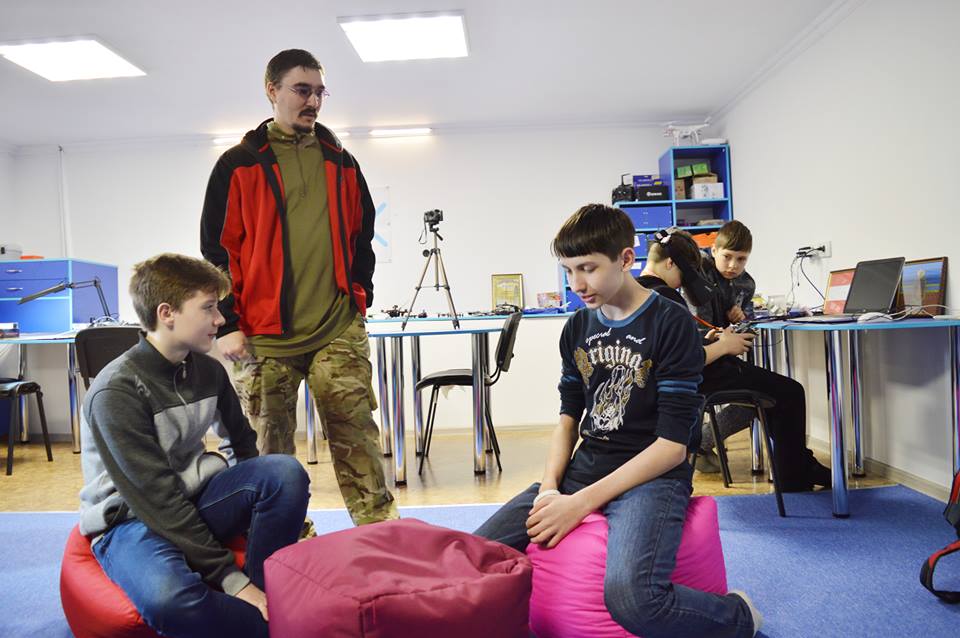
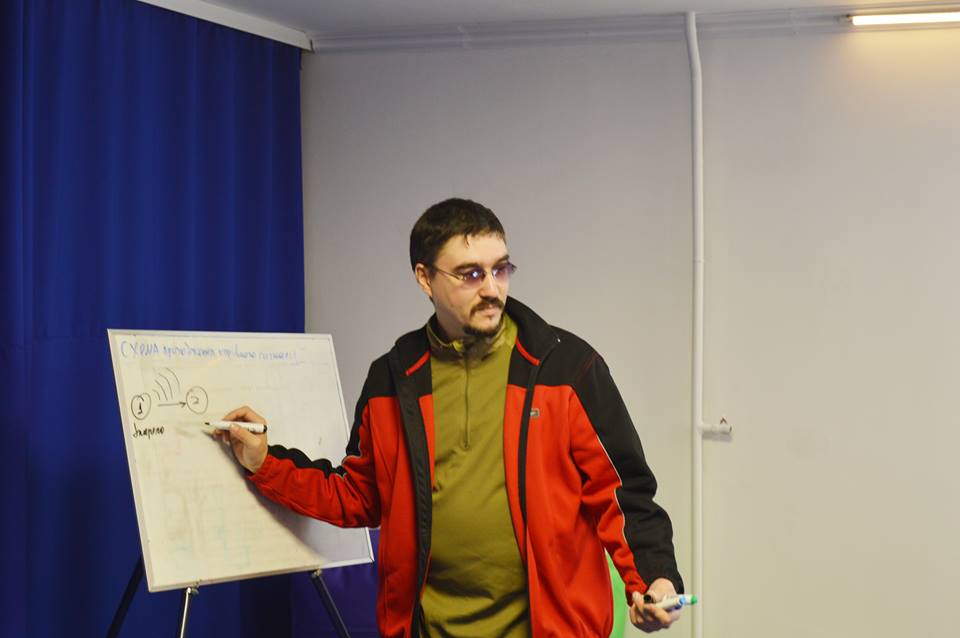
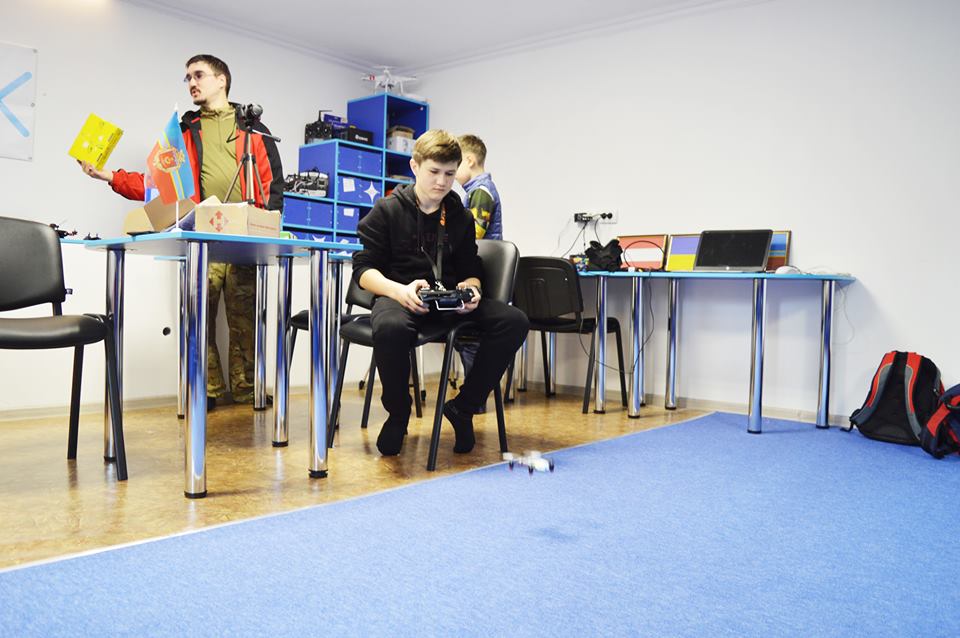
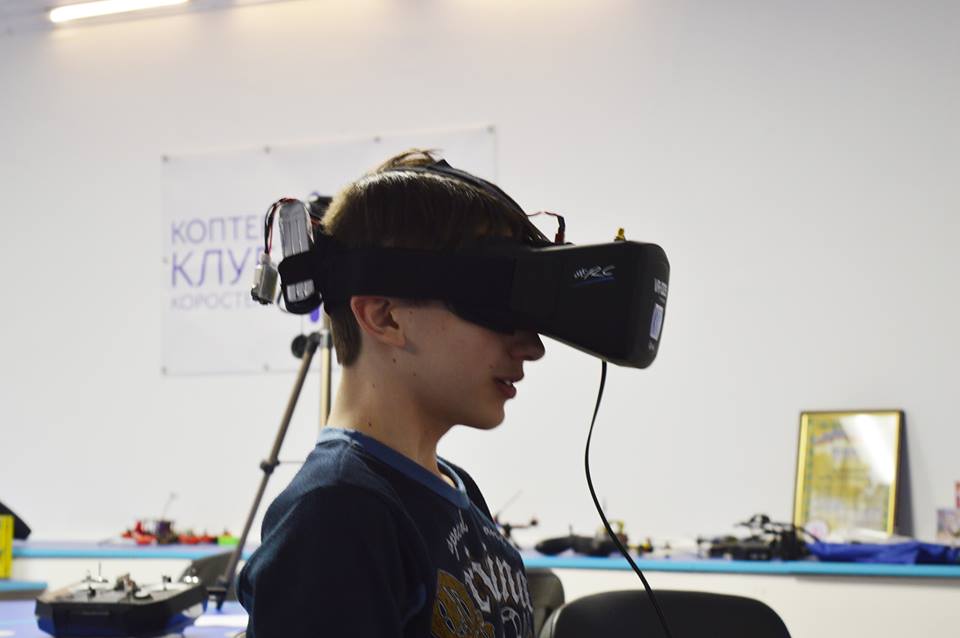
Erik sees his further development with drones:
“Drones are the future. Now people start to realize this. You can fly and see everything from the copter. However, if you fall down, the drone will be broken, not you. You should understand that this thing flies because of you and you fly with it.”
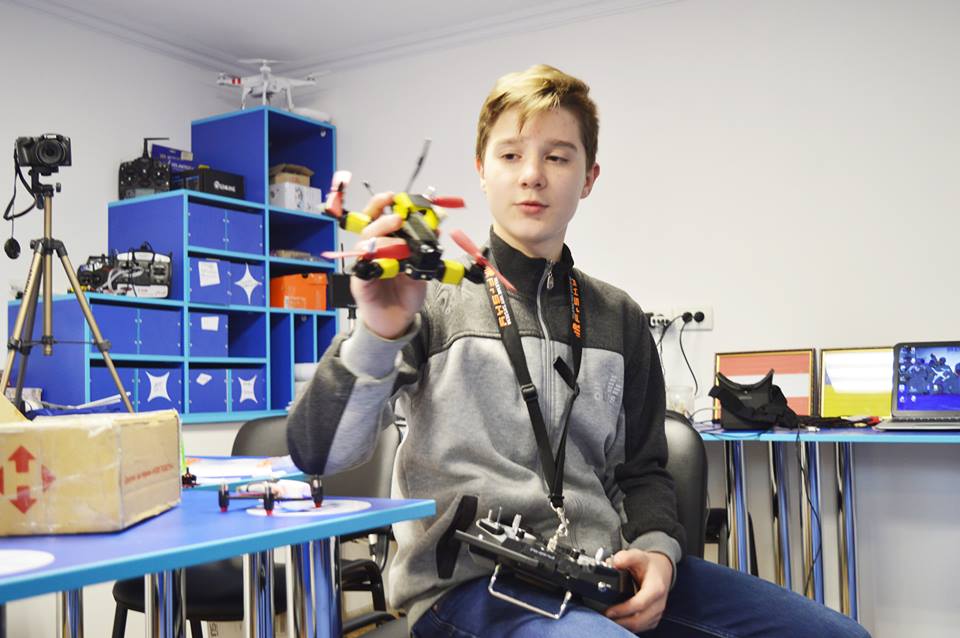
I asked guys what they feel when they fly:
“It's euphoria, drive. You are free like a bird and can do anything you want,” says Andriy, another member of the Copter Club.
Drone studies are expensive, however. Vania says that UAH 3500 ($131) per month are needed to teach one pilot.
Not all families can afford to pay at least something.
The club was supported by the Latvian government and Latvian Embassy in Ukraine which provided money for repairs of premises. Now it constantly needs money for drone details, because the equipment breaks often. Preparing for competitions also takes up money. And Vania's work should be paid for too:
“I can't combine our activity with something else. Otherwise, it will suffer. I had a choice: whether we do it and achieve some results, or I do something else and have to quit it. I've made my choice. So far we are flying. We can't turn off the engine as we would fall. But our battery is discharging.”
Recently Vania also agreed to have a post-war rehabilitation:
“Only recently I realized the need to work on myself in this direction. Rehabilitation is needed for many citizens of our country. Those who were at war as soldiers and those who saw it as civilians. I think that for civilians it is much worse. Because they couldn’t influence anything.”
He says that he was at war for the opportunity to build a country in which he would want to live and raise children. His fight for the better future goes on hundred kilometers from the front line, with other means and approaches.

